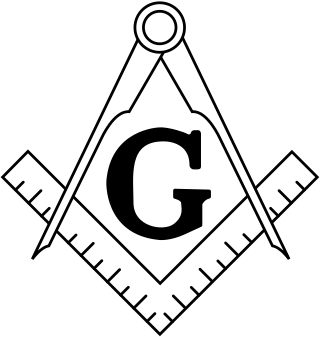
Freemasonry or Masonry refers to fraternal organisations that trace their origins to the local guilds of stonemasons that, from the end of the 14th century, regulated the qualifications of stonemasons and their interaction with authorities and clients. Modern Freemasonry broadly consists of two main recognition groups: Regular Freemasonry, which insists that a volume of scripture be open in a working lodge, that every member professes belief in a Supreme Being, that no women be admitted, and that the discussion of religion and politics do not take place within the lodge; and Continental Freemasonry, which consists of the jurisdictions that have removed some, or all, of these restrictions.
The history of Freemasonry encompasses the origins, evolution and defining events of the fraternal organisation known as Freemasonry. It covers three phases. Firstly, the emergence of organised lodges of operative masons during the Middle Ages, then the admission of lay members as "accepted" or "speculative" masons, and finally the evolution of purely speculative lodges, and the emergence of Grand Lodges to govern them. The watershed in this process is generally taken to be the formation of the first Grand Lodge in London in 1717. The two difficulties facing historians are the paucity of written material, even down to the 19th century, and the misinformation generated by masons and non-masons alike from the earliest years.

The Grand Lodge of Ireland is the second most senior Grand Lodge of Freemasons in the world, and the oldest in continuous existence. Since no specific record of its foundation exists, 1725 is the year celebrated in Grand Lodge anniversaries, as the oldest reference to Grand Lodge of Ireland comes from the Dublin Weekly Journal of 26 June 1725. This describes a meeting of the Grand Lodge to install the new Grand Master, The 1st Earl of Rosse, on 24 June. The Grand Lodge has regular Masonic jurisdiction over 13 Provincial Grand Lodges covering all the Freemasons of the island of Ireland, and another 11 provinces worldwide.
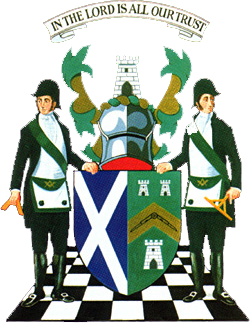
The Grand Lodge of Antient Free and Accepted Masons of Scotland is the governing body of Freemasonry in Scotland. It was founded in 1736. About one third of Scotland's lodges were represented at the foundation meeting of the Grand Lodge.
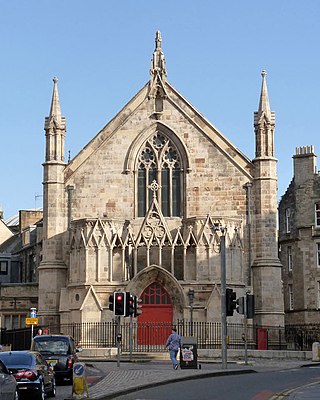
Bedlam Theatre is a theatre in the Old Town of Edinburgh, Scotland. The building was completed in 1848 for the New North Free Church. After closing as a church in 1941, the building served as a chaplaincy centre and then a store for the University of Edinburgh before reopening in 1980 as the student-run theatre of Edinburgh University Theatre Company (EUTC), operating during Edinburgh Fringe festival as venue 49.

The Knights Templar, full name The United Religious, Military and Masonic Orders of the Temple and of St John of Jerusalem, Palestine, Rhodes and Malta, is a fraternal order affiliated with Freemasonry. Unlike the initial degrees conferred in a regular Masonic Lodge, which only require a belief in a Supreme Being regardless of religious affiliation, the Knights Templar is one of several additional Masonic Orders in which membership is open only to Freemasons who profess a belief in Christianity. One of the obligations entrants to the order are required to declare is to protect and defend the Christian faith. The word "United" in its full title indicates that more than one historical tradition and more than one actual order are jointly controlled within this system. The individual orders 'united' within this system are principally the Knights of the Temple, the Knights of Malta, the Knights of St Paul, and only within the York Rite, the Knights of the Red Cross.

Lodge Mother Kilwinning is a Masonic Lodge in Kilwinning, Scotland, under the auspices of the Grand Lodge of Scotland. It is number 0 on the Roll, and is reputed to be the oldest Lodge not only in Scotland, but the world. It is thus styled The Mother Lodge of Scotland attributing its origins to the 12th Century, and is often called Mother Kilwinning.
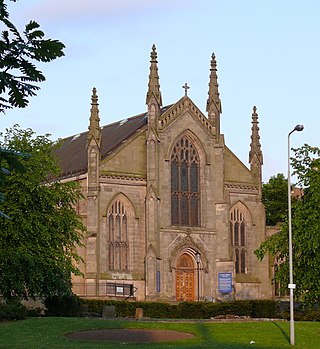
The Metropolitan Cathedral of Our Lady of the Assumption, also known as St Mary's Metropolitan Cathedral, is a Roman Catholic church in Edinburgh, Scotland. It is the seat of the Archbishop of Saint Andrews and Edinburgh and the mother church of Scots Catholicism. The cathedral church is located at the East End of New Town in the city center.

There are Masonic degrees named after the Knights Templar but not all Knights Templar Orders are Masonic.
There are a number of masonic manuscripts that are important in the study of the emergence of Freemasonry. Most numerous are the Old Charges or Constitutions. These documents outlined a "history" of masonry, tracing its origins to a biblical or classical root, followed by the regulations of the organisation, and the responsibilities of its different grades. More rare are old hand-written copies of ritual, affording a limited understanding of early masonic rites. All of those which pre-date the formation of Grand Lodges are found in Scotland and Ireland, and show such similarity that the Irish rituals are usually assumed to be of Scottish origin. The earliest Minutes of lodges formed before the first Grand Lodge are also located in Scotland. Early records of the first Grand Lodge in 1717 allow an elementary understanding of the immediate pre-Grand Lodge era and some insight into the personalities and events that shaped early-18th-century Freemasonry in Britain.
The first known Freemasons in Portugal were the Swiss John Coustos and two other Portuguese members of his lodge, who were arrested by the Portuguese Inquisition and questioned under torture in the 1740s. Coustos wrote a book detailing his sufferings under the Inquisition and pointed to 1728 as being the year of the first Lodge, although nothing is known of the first years of this Lodge and it was not then recognised by the Grand Lodge of England. Today there are several Masonic Obediences in Portugal.
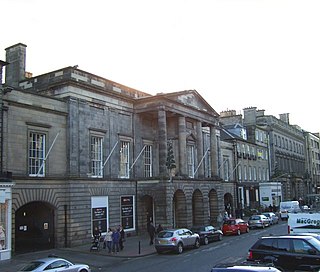
The Assembly Rooms are meeting halls in central Edinburgh, Scotland. Originally solely a meeting place for social gatherings, it is now also used as an arts venue and for public events, including the Edinburgh Festival Fringe and the Hogmanay celebrations. There are four rooms, with moveable chairs or tables, that are used year-round and are available for private functions: Music Hall, Ballroom, Supper Room and Edinburgh Suite.
Freemasonry in Scotland in lodges chartered by the Grand Lodge of Scotland comprises the Scottish Masonic Constitution as regular Masonic jurisdiction for the majority of freemasons in Scotland. There are also lodges operating under the Scottish Masonic Constitution in countries outside of Scotland. Many of these are countries linked to Scotland and the United Kingdom through the Commonwealth of Nations and prior colonies and other settlements of the British Empire although there are several lodges in countries such as Lebanon, Belgium, Chile and Peru, which do not have such connections.
Assembly is a theatre and comedy promotion company, producer and venue operator. It programmes and promotes entertainment events at venues in Edinburgh, London and Brighton, and is the longest-established of the so-called Big Four promoters at the Edinburgh Festival Fringe in August. Year-round audience numbers at Assembly events are more than 500,000, and the company's artistic director is William Burdett-Coutts.

The Pleasance is a theatre, bar, sports and recreation complex in Edinburgh, Scotland, situated on a street of the same name. It is owned by the University of Edinburgh, and for nine months of the year it serves the Edinburgh University Students' Association as a societies centre, sports complex, student union bar and entertainment venue.
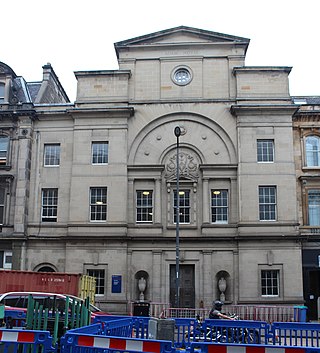
Adam House is a Category B listed building in Edinburgh, Scotland. It is owned by the University of Edinburgh, and used as studio spaces for the architecture school. It consists of 4 studio spaces and a lecture theatre.
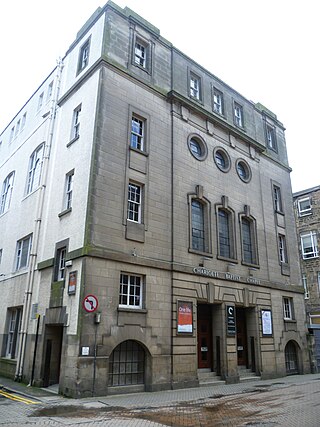
The Rose Theatre is an arts venue and Category B listed building on Rose Street, Edinburgh, Scotland, owned by ballet dancer and Olivier Award winning director Peter Schaufuss and is as a year round venue for theatre, comedy, music, dance and cabaret. It is also the home of the Rose Theatre Cafe. The venue is playing a major role during the Edinburgh Festival Fringe.

Freemasons' Hall in Edinburgh, Scotland, is the headquarters of Scottish Freemasonry, the Grand Lodge of Scotland. It is located at 96 George Street.
The Standard Scottish Rite is a Masonic rite practiced primarily in Scotland. It is considered one of the oldest rites in Freemasonry, with origins dating back to the late 16th century. The rite is known for its rich history, symbolism, rituals, and focus on brotherly love.














